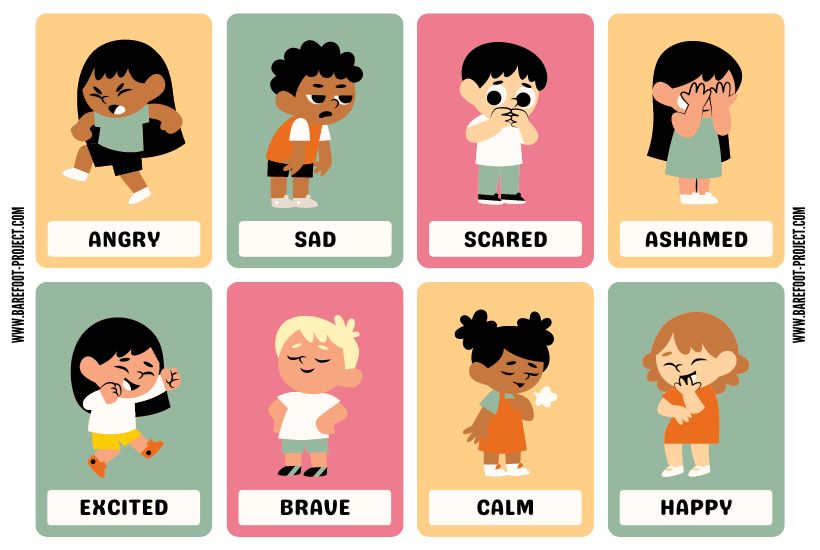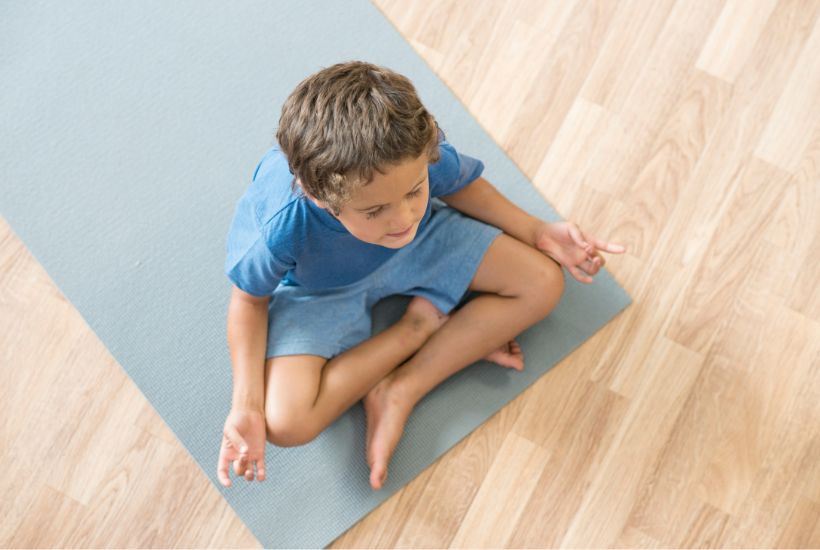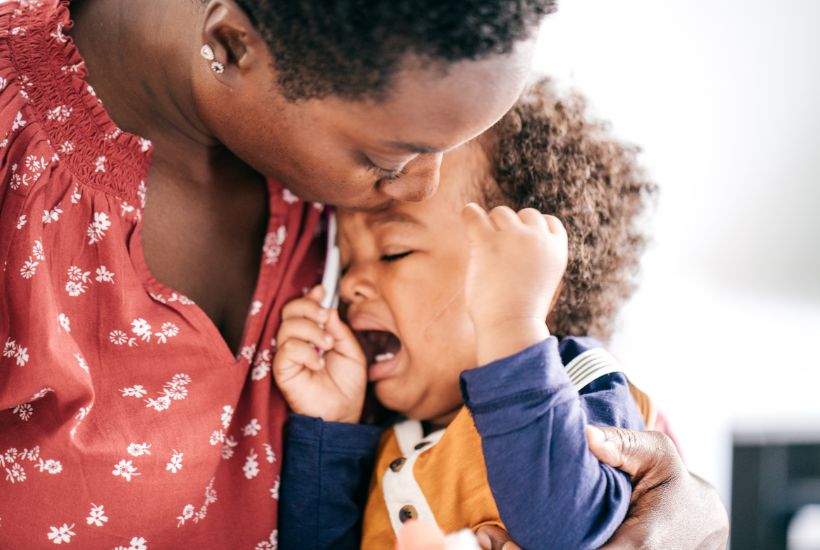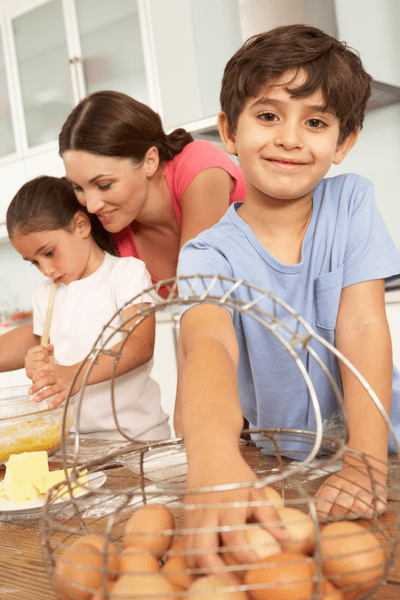How to Help Your Child Deal with Anger
My daughter loves to spend time with her friends. This time we were in Egypt, all of her family was there, and she had so much fun.
I started feeling anxious as time went by because I knew I had to tell her that we had to leave.
“Sweetie, we have to leave in 10 minutes,” and in 10 minutes, then I went again and told her, “Hey honey, let’s go,” and I knew it. I knew what was going to happen.
The tantrum starts, and it triggers me.
This is the reality for many parents, as they must deal with tantrums when it comes time to leave.
I know I’m not the only parent who struggles with this. Helping your child handle big emotions is hard. But there are some things you can do to help them (and you) healthily deal with anger.
A child who is angry and throwing a fit can be hard to deal with, but there are ways you can help them calm down and learn how to handle those big emotions.
In this blog post, we will discuss tips on how you can help your child healthily deal with anger!

Before you help your child deal with anger
Before you help your child deal with anger, you need to understand that anger is a normal emotion. It’s okay for your child to feel angry; they need to learn how to deal with that anger healthily.
You see, our brain is designed to protect and keep us safe. So when we feel threatened or like we’re in danger, our brain releases a hormone called cortisol.
Cortisol is also the “stress hormone” because it’s responsible for the “fight or flight” response. This is the body’s natural way of preparing to fight or run away from a perceived threat.
If a child throws a tantrum, they may not be able to fight or run away from the situation (like leaving a playdate), so that built-up energy and cortisol have to go somewhere.
The center of anger in the brain is the amygdala, which is responsible for the “fight or flight” response. When the amygdala is triggered, it sends a signal to the hypothalamus.
The hypothalamus then releases cortisol into the bloodstream. Cortisol increases heart rate and blood pressure and gives you a burst of energy so that you can either fight or run away from the situation.
So when a child is feeling angry, and they can’t express it healthily, that’s when tantrums happen.
Now that we understand how the brain responds to anger, let’s talk about some tips on how you can help your child healthily deal with anger.
Why it’s important to teach your child anger management skills
It’s important to teach your child anger management skills for a few reasons. First, as we mentioned before, anger is a normal emotion. It’s okay for your child to feel angry, but they need to learn how to deal with that anger healthily.
Because if your child didn’t learn how to handle their anger healthily, they might resort to unhealthy coping mechanisms like lashing out at others or bottling their emotions up.
Second, teaching your child anger management skills can help them in the long run. For example, if your child learns how to deal with their anger healthily now, they will be more likely to use those same skills as an adult when faced with stressful situations.
And lastly, teaching your child anger management skills can help reduce the number of tantrums they have. Tantrums are often a result of a child not knowing how to express their emotions healthily.
So, if you teach your child how to deal with their anger in a healthy way, they will be less likely to have tantrums.
Practical and Creative ways to help your child deal with anger
There are a few practical and creative ways you can help your child deal with anger.
Here are some tips on how you can help your child deal with anger:
1) Help them understand their Emotions.
One of the best things you can do to help your child deal with anger is to help them understand their emotions. This means teaching them how to identify their feelings and how to express them in a healthy way.
You can help your child understand their emotions by teaching them about the different parts of the brain that are responsible for those emotions. For example, you can explain to them how the amygdala is responsible for the “fight or flight” response and how cortisol is released when we’re feeling angry.
Helping your child understand emotion is essential because it helps them better express themselves, leading to healthier communication and fewer tantrums.

You can also help your child understand their emotions by teaching them about the different facial expressions and body language that accompany anger.
For example, you can explain to them how someone might look when they’re feeling angry. They might have furrowed brows, clenched fists, or red cheeks.
Teaching your child about the different facial expressions and body language that accompany anger will help them better understand and express their emotions.
2) Teach them how to use words to express their anger
Another way you can help your child deal with anger is by teaching them how to use words to express their emotions. This means teaching them how to communicate what they’re feeling in a healthy way.
One way you can do this is by modeling healthy communication for them. For example, if you’re feeling angry, explain to your child how you’re feeling and why.
“I’m feeling really angry right now because I’m stuck in traffic and will be late for my meeting.”
Or, if you see your child getting angry, help them label their emotions.
“It looks like you’re feeling really angry right now. Do you want to talk about what’s making you angry?”
Teaching your child how to use words to express their emotions is so important because it helps them communicate in a healthy way and prevents tantrums.

3) Help them find creative outlets to let out their anger.
Another way you can help your child deal with anger is by assisting them in finding creative outlets to let out their emotions. This means finding activities that help them express their anger in a healthy way.
Some creative outlets for anger include:
- Drawing or painting
- Playing an instrument
- Writing
- Punching a pillow
- Taking a walk
- Screaming into a pillow
- Counting to 20
- Deep breathing
Find what works best for your child and help them find an outlet that they can use to express their anger.
Helping your child find creative outlets to express their anger prevents tantrums because they’re not bottling up their emotions.
4) Teach them how to use “I” statements
One way you can help your child deal with anger is by teaching them to use “I statements.” I statements are phrases that help us express our emotions without attacking the other person.
For example, instead of saying, “You’re so annoying!” you could say, “I’m feeling really angry right now because I feel like you’re not listening to me.”
or “I’m feeling really frustrated because I can’t seem to get this project done.”
5) Avoid violent media
You can help your child deal with anger by avoiding violent media. This means keeping them away from movies, TV shows, video games, and music that promote violence.
You might be thinking, “But my child isn’t exposed to violence.” But even if they’re not directly exposed to it, they can still be affected by it.
For example, if you’re watching a violent movie, your child might see you getting angry and think that it’s okay to express their anger in a violent way.
Or, if you’re playing a violent video game, your child might think it’s normal to resolve conflicts through violence.
Avoiding violent media is important because it can impact your child’s development and lead to aggressive behavior.
6) Model healthy anger management for your child
One of the best ways you can help your child deal with anger is by modeling healthy anger management. This means showing them how to deal with their emotions in a healthy way.
For example, if you’re feeling angry, explain to your child how you’re feeling and why. For example, “I’m feeling really angry right now because I’m stuck in traffic and I’m going to be late for my meeting.”
Then, show them how you’re healthily managing your anger. For example, “I’m going to take a few deep breaths and listen to calm music until I feel better.”
This way, your child can see how to deal with their emotions healthily, and they’ll be more likely to do the same when they’re angry.
7) Don’t let tantrums get the best of you.
Don’t give in to tantrums. This means that if your child is throwing a tantrum, don’t give them what they want just to make them stop.
Giving in to tantrums will only reinforce the behavior and make it more likely for your child to have a tantrum in the future.
Your child is intelligent, and they are always learning; when you give in to tantrums, it teaches your child that if they throw a tantrum, they will get what they want.
So instead of giving in to tantrums, stay calm and help your child through their emotions.
8) Stay Calm
When your child is dealing with big emotions, it’s so important to stay calm. However, this can be difficult, especially if your child’s tantrums trigger you.
But it’s so important to stay calm because if you get angry, scream, hit, or slap your child; it will only make the situation worse.
Remember that your child is learning from you, so if you stay calm and help them through their emotions, they’ll be more likely to do the same in the future.
Remember that it’s not a power struggle. It’s about helping your child through their emotions in a healthy way.
9) Listen to your child
When your child is dealing with big emotions, it’s so important to listen to them. This means really listening, not just waiting for your turn to talk.
Make sure you’re giving them your full attention and really trying to understand how they’re feeling.
This can be difficult, but it’s so important because it will help you figure out how to best help them.
And, it will help your child feel heard and understood, which can be really helpful when they’re feeling angry.

I hope these tips help you help your child deal with anger in a healthy way! Remember, you’re not alone in this.
We’re all learning and growing, and we all have bad days.
But by teaching our children how to deal with their emotions in a healthy way, we can help them become happy and successful adults. Thanks for reading!
Share this post if you have a friend who might find it helpful. And if you have any tips on how to help your child deal with anger, please share them with me on Instagram!
Thanks for reading!







